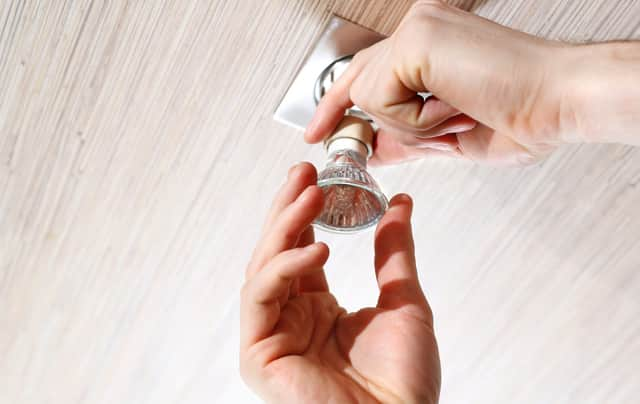Halogen bulbs will be banned in UK from October - and could cost £100 to replace


Halogen light bulbs will be banned from sale in the UK next month as part of the government’s plans to tackle climate change.
From 1 October, shops will no longer be allowed to sell the energy draining bulbs meaning households will instead have to buy more efficient LEDs.
Why are halogen bulbs being banned?
Advertisement
Hide AdAdvertisement
Hide AdThe ban on halogen light bulbs comes as part of a series of measures to address climate change.
It is expected that the switch to LED bulbs will cut 1.26 million tonnes of CO2, which is the equivalent of removing more than half a million cars.
The UK began phasing out the energy guzzling halogen bulbs in 2018, with the government announcing in June that they would be pulled from shelves this year.
The ban was originally meant to kick in on 1 September, but will now come into effect on 1 October.
LED light bulbs are much more energy efficient, using 80% less power than halogen and fluorescent bulbs, making them much cheaper to run.
The bulbs also last several years longer meaning households will not have to replace them as frequently.
A spokesperson for the department for business, energy and industrial strategy (BEIS), said: "Phasing out inefficient, energy-intensive halogen light bulbs will cut 1.26 million tonnes of CO2.
"This short one-month delay will ensure these new requirements can be implemented effectively immediately once live."
Advertisement
Hide AdAdvertisement
Hide AdThe government wants LED light bulbs to account for 85% of all bulbs sold by 2030. At the moment they only account for two thirds.
Fluorescent lights will also be banned from sale in the UK, although this will not take effect until 1 September 2023.
The ban will also include the sale of lighting fixtures with bulbs that cannot be replaced.
Households facing £100 cost to replace bulbs
While the ban on the sale of halogen bulbs will take effect from 1 October, households will not face a deadline to replace any existing bulbs in their home.
Instead, they will be allowed to gradually replace any halogen bulbs they have in their home as and when they run out.
The EnergySavingTrust has previously estimated that it would cost the average household £100 per year to replace all halogen bulbs with LEDs.
However, the costs of replacing them will pay off over time, as the switch could cut energy bills by more than £200 per year, according to Compare the Market research.
When the ban was announced in June, energy minister, Anne-Marie Trevelyan, said: “We’re phasing out old inefficient halogen bulbs for good, so we can move more quickly to longer lasting LED bulbs, meaning less waste and a brighter and cleaner future for the UK.
Advertisement
Hide AdAdvertisement
Hide Ad“By helping ensure electrical appliances use less energy but perform just as well, we’re saving households money on their bills and helping tackle climate change.”
Other energy saving measures
The ban on halogen bulbs follows other energy saving measures introduced in the UK to help tackle climate change.
This includes a new right to repair law on electrical products, which came into effect in July, requiring companies to fix appliances including TVs, washing machines and fridges.
It means electrical appliances can be more easily fixed, helping to tackle the 1.5 million tonnes of electrical waste generated in the UK each year.
By making parts for repairs readily available, the lifespan of products will be extended by up to 10 years avoiding having to throw appliances away prematurely, and cutting carbon emissions at the same time.
Drivers are also being encouraged to use a more environmentally-friendly fuel on forecourts as E10 replaced E5 as the standard petrol from September, and home owners face a gas boiler ban from 2025 as part of efforts to introduce greener alternatives.
This article originally appeared on our sister site, NationalWorld.